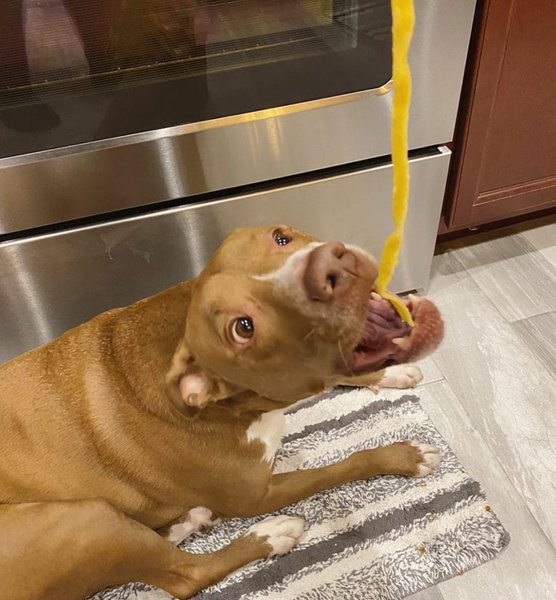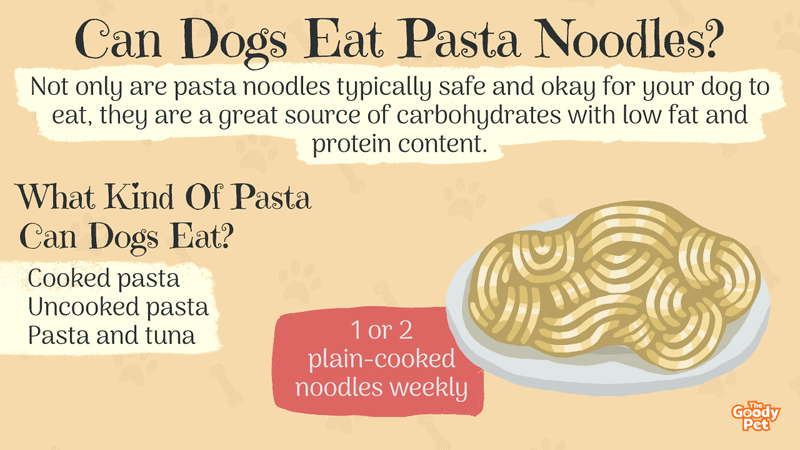Every dog owner has already considered whether or not they can give pasta noodles to their dogs, especially when eating while your pup pleadingly looks at you with sorrowful eyes. One may wonder if it is alright for a dog to have some pasta noodles.
Not only are pasta noodles typically safe and okay for your dog to eat, they are a great source of carbohydrates with low fat and protein content. Nonetheless, pasta noodles come with various health benefits and contain vital mineral salts, such as potassium, betaine, and phosphorus, all of which are important when putting together a well-balanced meal for your dog.
In case you’re wondering whether your puppy will find regular Italian pasta to be delicioso, you absolutely want to know the health benefits your dog will have upon consuming pasta noodles, as well as the right pasta type your pooch should eat.
In this article, we will take a look at everything related to providing your dog with pasta, including the kind of pasta that dogs can eat, whether it is possible for your dog to eat pasta with cheese, and whether your dog should eat brown pasta.
The article will also look at whether it is possible for your dog to eat plain cooked spaghetti noodles. But, before we get into all that, let’s talk about your main worry. Can dogs die from eating pasta?
Can Dogs Die From Eating Pasta?
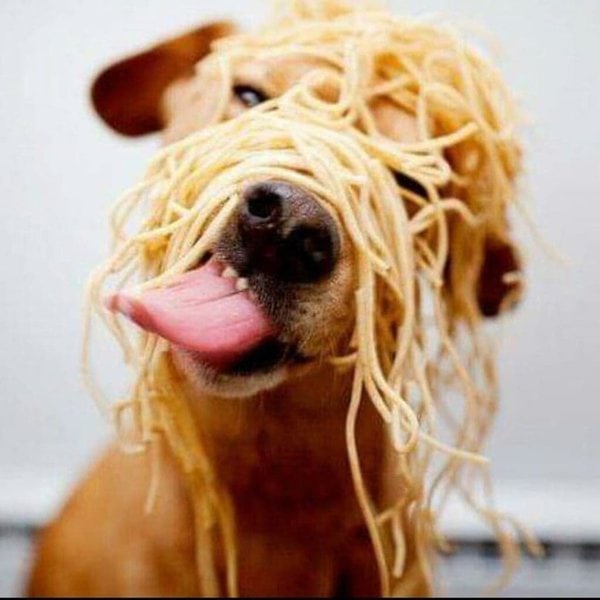
No, pasta, in its purest form, is unlikely to kill your dog, especially if prepared correctly. However, you must ensure that your dog is not sensitive to grain or allergic to wheat.
Watch your dog carefully to see if it’s allergic to any of the ingredients. Signs of food allergy in dogs include:
What Is The Amount Of Pasta Noodles That My Dog Can Consume?
Do not, under any circumstances, give your dog more than one cup of pasta at a time. Feed your dog one or two plain-cooked noodles weekly. Anything more than that will jeopardize your doggie’s health.
The signs of feeding your dog too much pasta may include:
- Excessive thirst
- Weight gain
- Lack of interest in daily activities
- Fatigue
- Excessive urination
What Is The Best Way To Make Pasta Noodles For My Dog?
It’s crucial to remember to obtain the correct amount of pasta noodles for your dog when you’re preparing it. Also, avoiding seasoning and sauce during the cooking process is very important. Generally, ingredients used to make pasta include eggs, water, and wheat flour.
What Kind Of Pasta Can Dogs Eat?
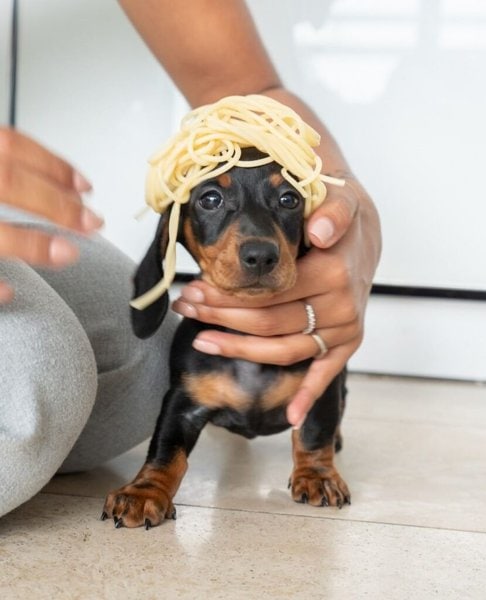
Plain pasta is normally perfect for dogs, whether cooked or uncooked. It comprises simple ingredients such as water, eggs, and flour that are safe for dogs.
You’ll find a variety of low-carb pastas made from different ingredients such as rice, lentils, and chickpeas. Feed your pooch on rice to improve its general health and alleviate gastrointestinal complications.
Brown rice is a fantastic way to supplement your pup’s diet with vitamins. It’s rich in fiber and easy to digest, making it an excellent diet for your dog with a stomach problem. It remains the best choice for those who feed their dogs on a homemade diet.
Can Dogs Eat Cooked Pasta Noodles?
Cooked pasta is preferable to raw pasta for your dog, because it is easier for dogs to chew and swallow. However, the cooked pasta has to be basically plain and not coated in any sauce.
Even though a sauce does not consist of anything poisonous, acidic sauce ingredients can irritate your dog’s stomach and, therefore, should be avoided.
Remember that, while cooked pasta is theoretically healthy for dogs, it is a high-carbohydrate diet. Pups prefer a protein-dense diet, high in fat and low in carbohydrates. Too much cooked pasta will cause your pooch to easily gain more weight and possibly hinder the absorption of nutrients.
Is Uncooked Pasta Good For Dogs?
It is very safe to feed your dog a moderate amount of uncooked pasta. In fact, If your puppy is not sensitive to raw pasta, it will not harm him.
However, raw pasta may easily hurt your fur friend when given in excess and on a regular basis. Some of the signs that your dog will show after overeating uncooked pasta include:
- Itching
- Weight gain
- Tiredness
- Lack of interest in daily activities
Can Dogs Eat Pasta And Tuna?
Pasta and tuna are both beneficial to dogs, but only in the amounts recommended for regular intake. Tuna is high in Omega-3 fatty acids and lean protein, which are anti-inflammatory and help to improve the heart and skin health.
Can Dogs Eat Cheese And Pasta?
Yes, your dog can feed on cheese and pasta. In fact, for puppies, cheese is frequently used as a training tool.
While most dogs enjoy cheese, do note that, however, some dogs are lactose intolerant. Before you feed your furry friend on cheese, watch it closely to ensure it’s not intolerant to cheese. The signs will include abdominal discomfort, vomiting, and diarrhea after ingesting cheese.
Cheese provides your dog with health benefits as it contains essential fatty acids, vitamin A, and calcium. Since most doggies enjoy cheese, dog owners frequently use it to treat-motivated pups. This snack can also be used to cover up pills for dogs who need medication.
How Much Cheese Is Okay For Dogs?
Give your dog small pieces of cheese, just about the size of your fingernail, as an occasional treat or encourage it to take medicines. Even if your dog can tolerate cheese, it is usually better to feed it in moderation.
Feeding your dog excess cheese will lead to weight gain and obesity, as cheese is high in fat. For worse cases, it may cause pancreatitis in dogs, which is deemed to be dangerous and potentially fatal.
In addition to the issues caused by the high-fat content, some cheeses contain hazardous herbs or other ingredients for dogs, including onions, garlic, and chives. Before you purchase cheese for your dog, make sure you read the cheese’s ingredients to keep your dog healthy.
What Kind Of Cheese Is Good For My Dog?
Feed your dog on low-fat cheeses such as cottage cheese, mozzarella, and soft-goat cheese.
Cottage cheese contains low-fat content and sodium, which helps in lowering the chances of obesity in your dog. It also helps in lowering the risk of intestinal upset since it is lower in lactose.
Avoid feeding your dog blue cheese. The fungus responsible for the production of blue cheeses like Stilton contain a substance known as roquefortine C. Since dogs are extremely sensitive to this, they’ll develop complications such as seizures, high temperature, and vomiting after ingesting blue cheese.
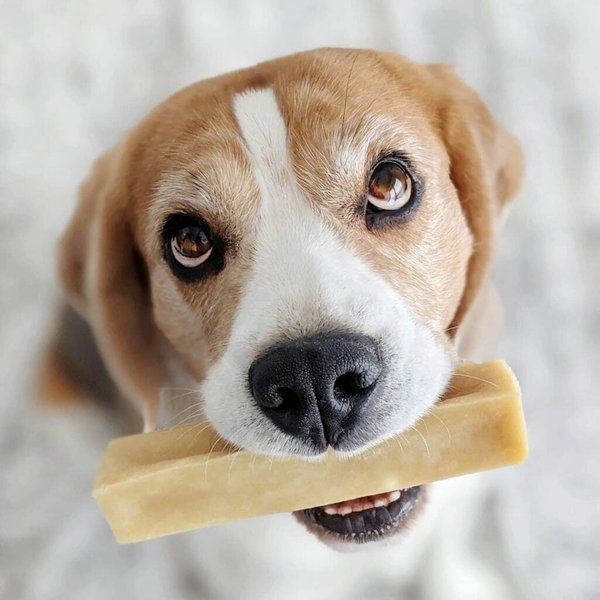
Are Pasta Sauces Safe For Dogs?
No, both homemade and canned pasta sauces contain common ingredients, such as garlic and onions, both of which are found to be harmful to dogs.
Garlic destroys dog’s red blood cells, causing them to burst and produce hemolytic anemia, a possibly deadly illness. The garlic powder found in prepackaged meals is more powerful than whole garlic.
Since onions have the same harmful effects, you should not offer your dog any form of pasta sauce but instead give them plain noodles.
Can Dogs Have Plain Cooked Spaghetti Noodles?
Plain-cooked spaghetti is typically okay for dogs. You can occasionally give your dog spaghetti, but only if it is prepared without any additional ingredients or seasoning.
Even though the sauces we add are the most delicious portion of the dish, these additives may cause a slew of issues for your dog. It’s not only because certain components are harmful to them like garlic, but also the salt or sugar content found in most spaghetti sauces will cause problems for a pup’s digestive system.
